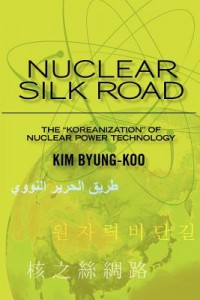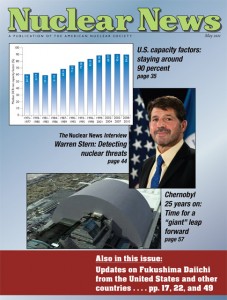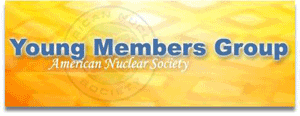Challenging scientific organizations to adhere to scientific methods
![tr-senate[1]](https://cdn.ans.org/cafe/2011/08/tr-senate16.jpg)
Rockwell

A message from Goodway Technologies
Optimizing Maintenance Strategies in Power Generation: Embracing Predictive and Preventive Approaches
![tr-senate[1]](https://cdn.ans.org/cafe/2011/08/tr-senate16.jpg)
Rockwell
Facts vs. myths about the health effects of Fukushima and Chernobyl. The conclusions of scientists studying health consequences may be startling to those exposed only to commonly held beliefs and traditional media (and Chernobyl Diaries!)
 As part of the team that supported the startup of Yonggwang-3 and -4 (South Korea's first nuclear units, built in a technology transfer program with Combustion Engineering), I thought it long overdue to see a book that chronicled South Korea's journey from an impoverished nation to one of the world's leading players in the nuclear industry (e.g., South Korea has 21 operating reactors versus Germany's 17).
As part of the team that supported the startup of Yonggwang-3 and -4 (South Korea's first nuclear units, built in a technology transfer program with Combustion Engineering), I thought it long overdue to see a book that chronicled South Korea's journey from an impoverished nation to one of the world's leading players in the nuclear industry (e.g., South Korea has 21 operating reactors versus Germany's 17).
The discovery of fire a million years ago must have been terrifying to cave men and women. Since that time, many people have died and much damage to the earth has occurred as a result of chemical energy released through fire. Nevertheless, that chemical energy found its place in the world, providing great benefits, and most people take it for granted.
 The hard-copy May issue of Nuclear News will soon be in the hands of American Nuclear Society members. It will also be available electronically to members.
The hard-copy May issue of Nuclear News will soon be in the hands of American Nuclear Society members. It will also be available electronically to members.
Now that the recent events at the nuclear plants at Fukushima are largely behind us and the stabilization is underway, we look to the 25th anniversary of Chernobyl and recognize that comparisons are inevitable. But it's vital that we keep these events in perspective as we face the challenges of developing our energy resources for our global future.
There are many facets of my chosen avocation as a pro-nuclear blogger and podcaster, but one aspect that has been prominent during the 25 days since the Japanese earthquake, tsunami, and nuclear nightmare at Fukushima has been that of atomic educator. Following the role model of my favorite teachers, I have worked hard to maintain a two-way flow of information-successful educators have to be open-minded learners. There is no doubt that I know a lot more about the design and operation of boiling water reactors with MK I containment vessels now than I knew four weeks ago.
 At a session on educational programs during a recent ANS meeting, a fairly new graduate student in nuclear engineering described a nuclear survey course that he had taken at his university. The graduate student had not studied nuclear engineering as an undergrad, and when he said, "I had never really heard of Chernobyl before I took this course," you could almost hear an audible gasp among the more, well, mature members of the audience.
At a session on educational programs during a recent ANS meeting, a fairly new graduate student in nuclear engineering described a nuclear survey course that he had taken at his university. The graduate student had not studied nuclear engineering as an undergrad, and when he said, "I had never really heard of Chernobyl before I took this course," you could almost hear an audible gasp among the more, well, mature members of the audience.